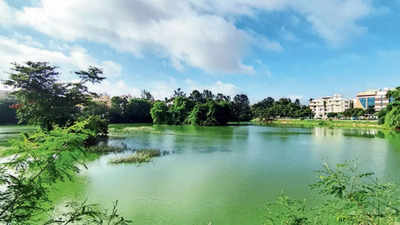- News
- City News
- bengaluru News
- Testing flaws point to BBMP STPs choking 15 Bengaluru lakes: Study
Trending
Testing flaws point to BBMP STPs choking 15 Bengaluru lakes: Study
Researchers have identified inconsistencies in sewage treatment plants (STPs) across 15 Bengaluru lakes, missing crucial testing parameters. This has led to water quality issues and fishkills. Only three STPs provided full data. Recommendations include evaluating STP effectiveness, adhering to standards, and potentially transferring management to BWSSB or establishing a monitoring mechanism.


The prolonged inconsistencies in testing parameters have resulted in eutrophication, algal bloom, a considerable drop in the dissolved oxygen levels, and incidents of fish kill at these lakes, according to an analytical report, ‘Efficiency and Impact of BBMP’s STP for Lakes’, published by ActionAid Association of India on Friday.
Analysing the functioning of STPs between Jan 2022 and July 2024, students of the National Law School of India University (NLSIU) and St Joseph’s School of Social Work, along with ActionAid researchers, evaluated the KSPCB reports on water quality and obtained information under the RTI Act besides visiting some of the lakes for collecting data.
Of the 15 STPs, only three at Bhattarahalli, Herohalli and Iblur have furnished full information on the quality of water, and the rest provided only partial information.
Raghavendra Pachhapur, senior project lead at ActionAid, said, “Out of the studied STPs, 10 treatment plants were not testing for all the parameters notified by the KSPCB. While a few STPs conducted water tests once a month, some others tested water twice a month. Inconsistency in parameters tested was found in 67% of the STPs as they were not testing for all parameters notified by the KSPCB in 2021.”
He also pointed out that some of the STPs stated consistent values for faecal coliform, biochemical oxygen demand (BOD), and chemical oxygen demand (COD).
“The water quality reports for Challakere and Kalena Agrahara lakes revealed identical and consistent values for three continuous months, suggesting potential irregularities in the water sampling or reporting process,” he said.
He also explained that some of these missing parameters during the tests are factors causing eutrophication, algal bloom, and damage to the quality of water. Andrahalli, Bhattarahalli, Dasarahalli, Herohalli, Uttarahalli and Dorekere lakes lacked BOD, indicating higher levels of biological content and raising questions over the effectiveness of STPs.
Referring to increased incidence of fishkill in the city lakes in 2023, the research report said, “Four such incidents were reported at Iblur, Challakere and Bhattarahalli Lakes, which are attached to the BBMP STPs. These incidents highlight the potential shortcomings in pollution control and water quality management efforts. The occurrences of fishkills, despite the presence of STPs, indicate a possible failure in addressing water quality issues adequately. Further investigation is necessary to assess specific factors contributing to these incidents and implement corrective measures to prevent their recurrence.”
End of Article
FOLLOW US ON SOCIAL MEDIA










